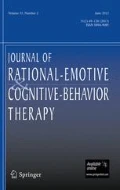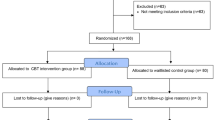Abstract
The stress level of pupils in primary schools is increasing at a worrying rate. The objective of this study was to determine the effect of cognitive behavior therapy (CBT) for stress reduction among primary of education pupils in Nigeria. The research design used in the study was a pretest/post-test and no-treatment control group. The participants of the study were 96 pupils who had experienced a high level of stress. The participants were assigned either to treatment group (n = 48) or no-treatment group (n = 48). The Educational Stress Scale for Pupils was the measure used for data collection in the study, while repeated measures analysis of variance was used for data analysis. After the intervention, the results indicated a significant reduction in the stress level of the pupils in the treatment group when compared to those in the no-treatment control group, F(1, 95) = 471.67, p >.001, \(\eta_{p}^{2}\) = .834]. Further significant reduction was observed in the stress level of the pupils in the treatment group when compared to those in the no-treatment control group after follow-up assessment; F(1,102) = 493.94, p > .001, \(\eta_{p}^{2}\) = .840]. Cognitive behavior therapy was significantly effective for stress reduction among pupils in primary education institutions. Therefore, counsellors, early childhood teachers, health-care practitioners and social workers may wish to use CBT principles to help pupils reduce stresses.


Similar content being viewed by others

References
Auerbach, J. E. (2006). Cognitive coaching. Evidence based coaching handbook: Putting best practices to work for your clients, pp. 103–127.
Beck, J. G., Coffey, S. F., Foy, D. W., Keane, T. M., & Blanchard, E. B. (2009). Group cognitive behavior therapy for chronic posttraumatic stress disorder: An initial randomized pilot study. Behavior Therapy, 40(1), 82–92.
Bernard, M., Joyce, M., & Rosewarne, P. (1983). Helping teachers cope with stress. Rational-emotive approaches to the problems of childhood, pp. 415–466.
Bisson, J., & Andrew, M. (2007) Psychological treatment of post-traumatic stress disorder (PTSD). Cochrane Database of Systematic Reviews. https://doi.org/10.1002/14651858.CD003388.pub3. Update in: Cochrane Database of Systematic Reviews 2013;12:CD003388. PMID: 17636720.
Brobeck, E., Marklund, B., Haraldsson, K., & Berntsson, L. (2007). Stress in children: how fifth-year pupils experience stress in everyday life. Scandinavian Journal of Caring Sciences, 21(1), 3–9.
Clark, D. M. (2011). Implementing NICE guidelines for the psychological treatment of depression and anxiety disorders: the IAPT experience. International Review of Psychiatry, 23(4), 318–327.
David, D., Cotet, C., Matu, S., Mogoase, C., & Stefan, S. (2018). 50 years of rational-emotive and cognitive-behavioral therapy: A systematic review and meta-analysis. Journal of Clinical Psychology, 74(3), 304–318.
Ellis, A., Gordon, J., Neenan, M., & Palmer, S. (1997). Stress counseling; a rational emotive behaviour approach. New York: Springer Publisher Company.
Feldman, J. M., Eisenberg, E. J., Gambini-Sudrez, E., & Nassau, J. H. (2007). Differential effects of stress management therapies on emotional and behavioral disorders. In P. M. Lehrer, R. L. Woolfolk, & W. E. Sime (Eds.), Principles and practice of stress management, (pp. 638–681). The Guilford Press.
Grossman, P., Niemann, L., Schmidt, S., & Walach, H. (2004). Mindfulness-based stress reduction and health benefits: A meta-analysis. Journal of Psychosomatic Research, 57(1), 35–43.
Horowitz, M. J. (1986). Stress-response syndromes: A review of posttraumatic and adjustment disorders. Hospital Community Psychiatry, 37(3), 241–249. https://doi.org/10.1176/ps.37.3.241
Igbokwe U. L., Onyechi, K. C. N., Ogbonna, C. S., Eseadi, C., Onwuegbuchulam, A. C., Nwajiuba, C. A., Ugodulunwa, C. C., Eze, A., Omaeze, K., Patrick, C. P., Ekechukwu, L. E., Egbe, C. I., Nnachi, R. A., & Anyaegbunam E. N. (2019). Rational emotive intervention for stress management among english education undergraduates: Implications for school curriculum innovation. Medicine (Baltimore) 98(40), e17452. https://doi.org/10.1097/MD.0000000000017452
Koszycki, D., Benger, M., Shlik, J., & Bradwejn, J. (2007). Randomized trial of a meditation-based stress reduction program and cognitive behavior therapy in generalized social anxiety disorder. Behaviour Research and Therapy, 45(10), 2518–2526.
Lazarus, R. S. (1966) Psychological stress and the coping process. New York: McGraw-Hill.
Miller, R. C., & Berman, J. S. (1983). The efficacy of cognitive behavior therapies: A quantitative review of the research evidence. Psychological Bulletin, 94(1), 39.
Ogbuanya, T. C., Eseadi, C., Orji, C. T., Ohanu, I. B., Bakare, J., & Ede, M. O. (2017). Effects of rational emotive behavior coaching on occupational stress and work ability among electronics workshop instructors in Nigeria. Medicine (Baltimore), 96(19):e6891. https://doi.org/10.1097/MD.0000000000006891
Onuigbo, L. N., Eseadi, C., Ugwoke, S. C., Nwobi, A. U., Anyanwu, J. I., Okeke, F. C., Agu, P. U., Oboegbulem, A. I., Chinweuba, N. H., Agundu, U. V., Ololo, K. O., Okpoko, C., Nwankwor, P. P., Eze, U. N., & Eze, P. (2018). Effect of rational emotive behavior therapy on stress management and irrational beliefs of special education teachers in Nigerian elementary schools. Medicine (Baltimore), 97(37):e12191. https://doi.org/10.1097/MD.0000000000012191
Otu, M. S., & Omeje, J. C. (2021). The effect of rational emotive career coaching on dysfunctional career beliefs in recent university graduates. Journal of Rational-Emotive & Cognitive-Behavior Therapy. https://doi.org/10.1007/s10942-020-00383-y
Palmer, S., & Gyllensten, K. (2008). How cognitive behavioural, rational emotive behavioural or multimodal coaching could prevent mental health problems, enhance performance and reduce work related stress. Journal of Rational-Emotive & Cognitive-Behavior Therapy, 26(1), 38–52. https://doi.org/10.1007/s10942-007-0069-y
Richardson, K. M., & Rothstein, H. R. (2008). Effects of occupational stress management intervention programs: a meta-analysis. Journal of Occupational Health Psychology, 13(1), 69.
Schnurr, P. P., Friedman, M. J., Engel, C. C., Foa, E. B., Shea, M. T., Chow, B. K., & Haug, R. (2007). Cognitive behavioral therapy for posttraumatic stress disorder in women: A randomized controlled trial. JAMA, 297(8), 820–830.
Shapiro, S. L., Astin, J. A., Bishop, S. R., & Cordova, M. (2005). Mindfulness-based stress reduction for health care professionals: results from a randomized trial. International Journal of Stress Management, 12(2), 164.
Smith, G. F. (2003). Beyond critical thinking and decision making: Teaching business students how to think. Journal of Management Education, 27(1), 24–51.
Sorenson, R. D. (2007). Stress management in education: Warning signs and coping mechanisms. Management in Education, 21(3), 10–13.
Stein, D. J., Ipser, J. C., & Seedat, S. (2006). Pharmacotherapy for post traumatic stress disorder (PTSD). Cochrane Database of Systematic Reviews, 2006(1), CD002795. https://doi.org/10.1002/14651858.CD002795.pub2
Sun, J., Dunne, M. P., Hou, X.-Y., & Xu, A.-Q. (2011). Educational Stress Scale for Adolescents: Development, validity and reliability with Chinese students. Journal of Psychoeducational Assessment, 29(6), 534–546.
Ugwoke, S. C., Eseadi, C., Igbokwe, C. C., Chiaha, G. T. U., Nwaubani, O. O, Orji, C. T., Ugwuanyi, L. T., Chukwuma, I. S., Edikpa, E. C., Ogakwu, V. N., Onu, E. A., Agu, P., Nwobi, U. A., Omeke, F., Okeke F. C., Ezema, R. N., & Abugu, L. I. (2017). Effects of a rational-emotive health education intervention on stress management and irrational beliefs among technical college teachers in Southeast Nigeria. Medicine (Baltimore) 96(31):e7658. https://doi.org/10.1097/MD.0000000000007658
Ugwuozor, F. O., Otu, M. S., & Mbaji, I. N. (2021). Critical thinking intervention for stress reduction among undergraduates in the Nigerian Universities. Medicine, 100(11), e25030.
Van der Klink, J., Blonk, R., Schene, A. H., & Van Dijk, F. (2001). The benefits of interventions for work-related stress. American Journal of Public Health, 91(2), 270.
Author information
Authors and Affiliations
Corresponding author
Additional information
Publisher's Note
Springer Nature remains neutral with regard to jurisdictional claims in published maps and institutional affiliations.
Rights and permissions
About this article
Cite this article
Otu, M.S., Dike, I.C., Ebizie, E.N. et al. Cognitive Behavior Therapy and Stress Reduction among Primary Education Pupils in Nigeria. J Rat-Emo Cognitive-Behav Ther 40, 144–154 (2022). https://doi.org/10.1007/s10942-021-00403-5
Accepted:
Published:
Issue Date:
DOI: https://doi.org/10.1007/s10942-021-00403-5



